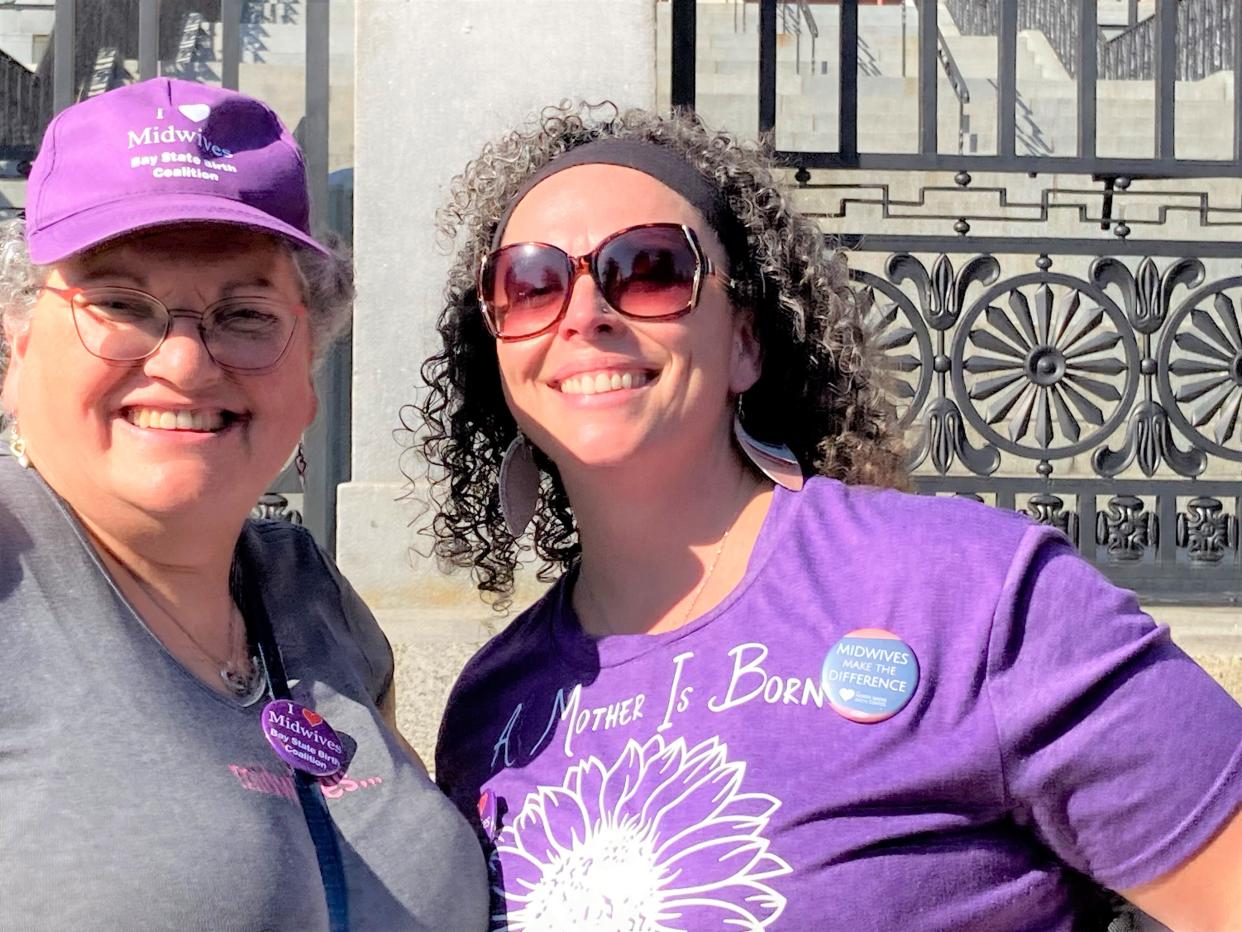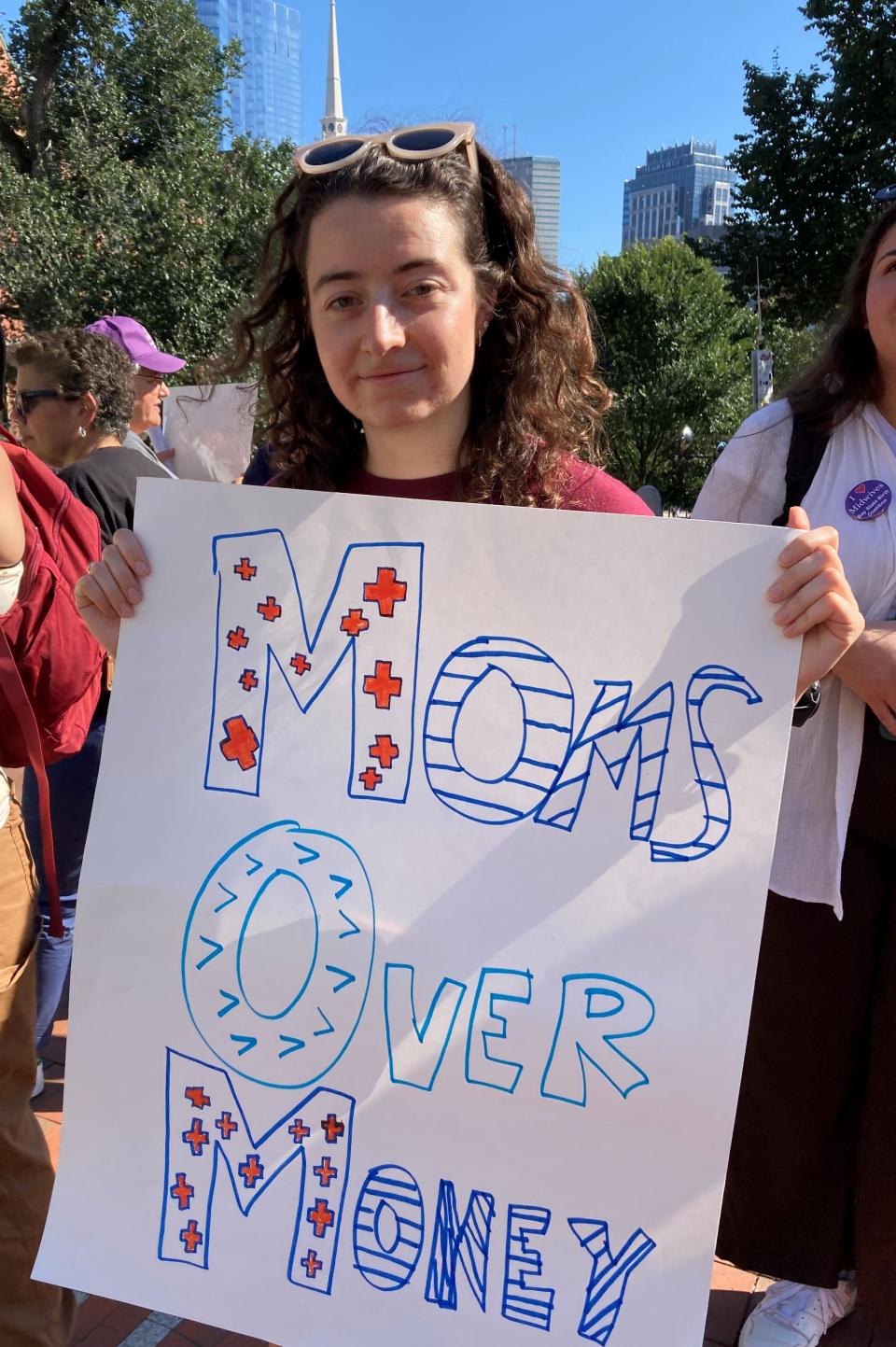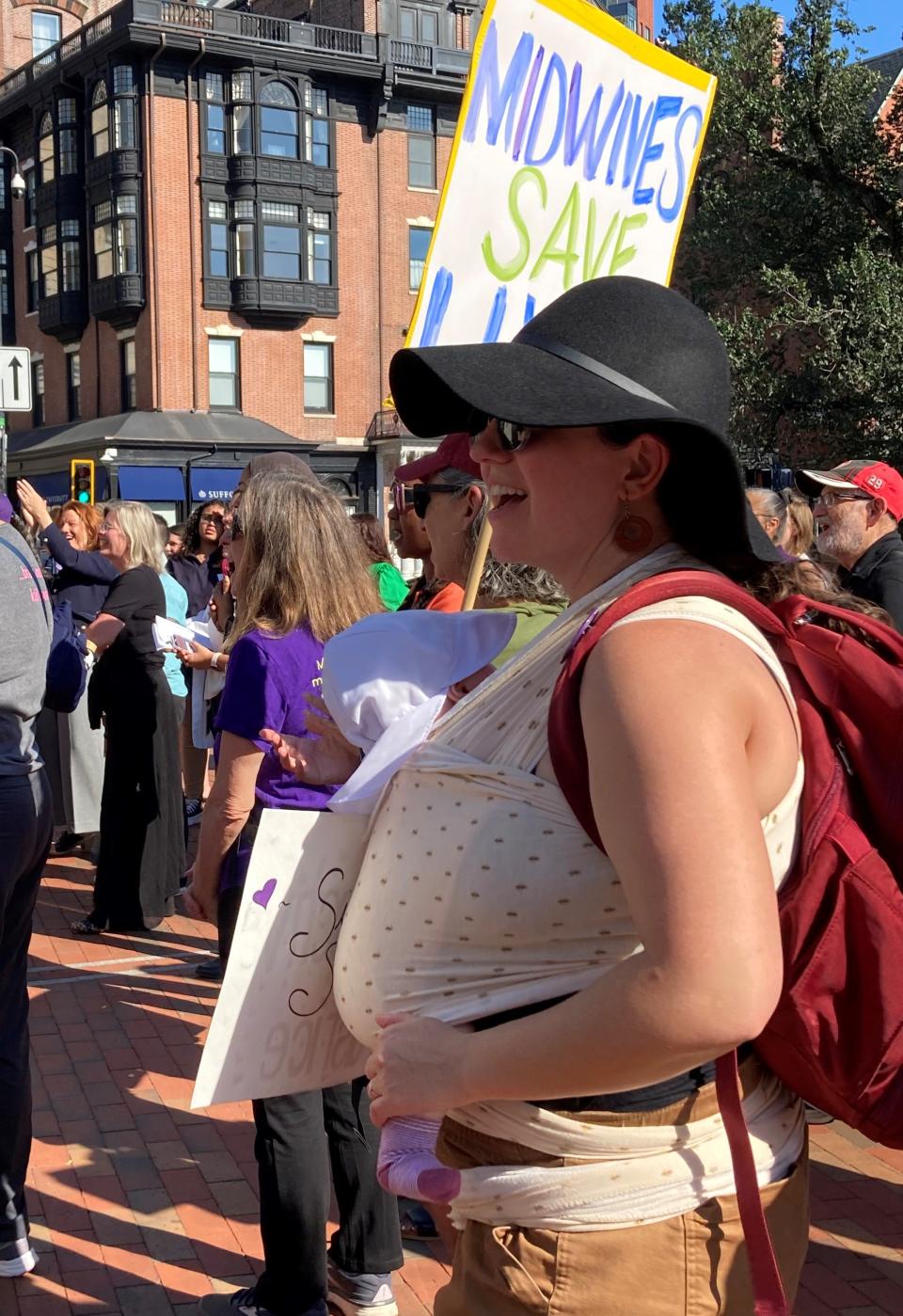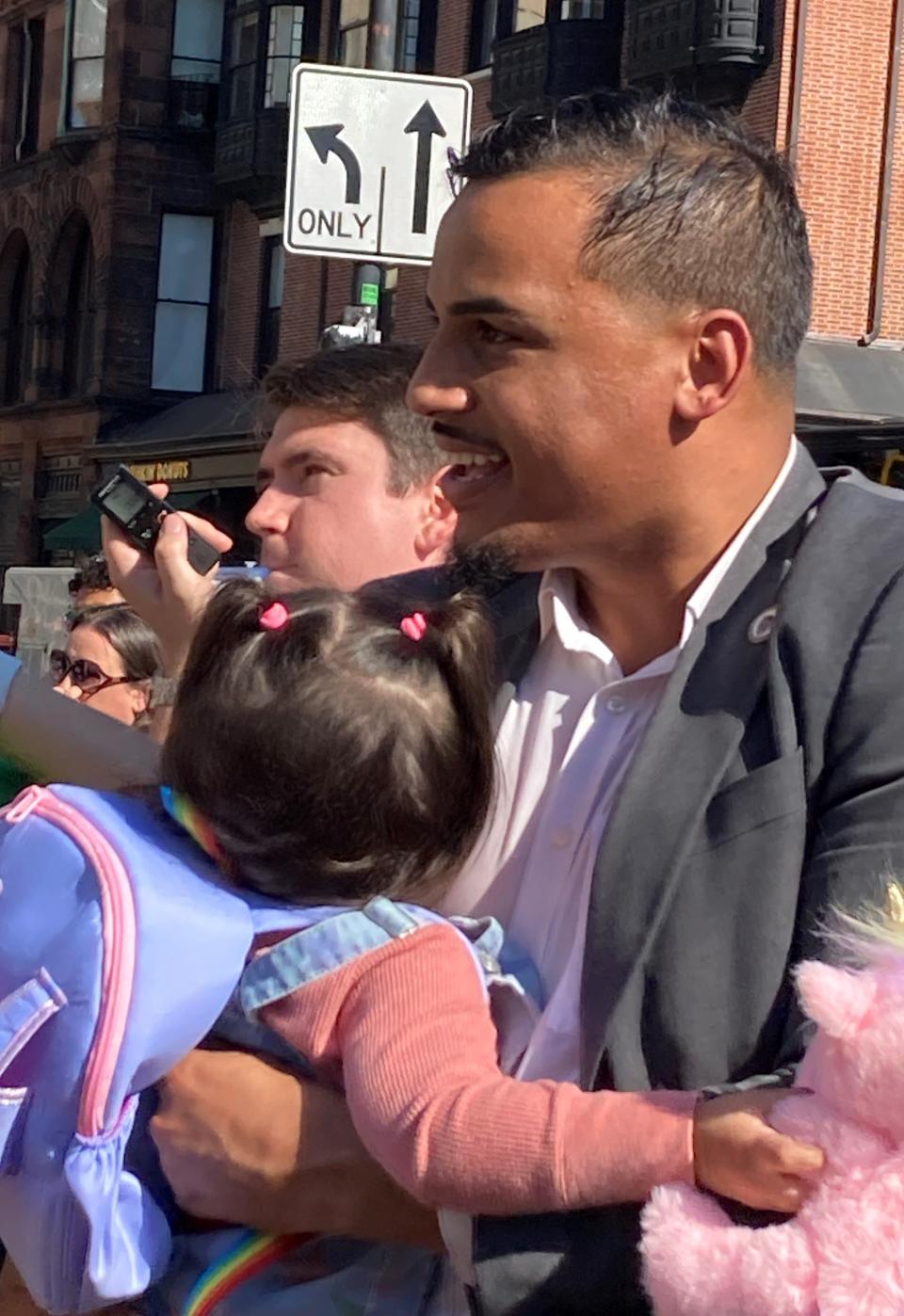Maternal health advocates in Mass. push bills to train, license and reimburse midwives

BOSTON - They came with signs, with strollers and their babies in their arms. Dozens of people attended a rally on the State House steps Thursday to demand Massachusetts address the increase in maternal morbidity rates for all Bay State women, especially women of color.
“It is shameful Massachusetts doesn’t have policies in place, the infrastructure, to give women choices in birthing experiences,” said Danette Siegel, a North Andover mother of two. She was one of a half-dozen speakers advocating for changes that include increasing the participation of midwives and doulas in noncomplicated pregnancies.
Siegel, whose experience included a water birth, was so impressed by the midwives who guided her through the birth of her two daughters that she became a doula. Now she is intent on changing the story of birth.
First steps for Siegel and advocates is to have the state Legislature pass bills that would integrate midwives into the birthing experience. The bills open a pathway for training, certification and licensure of midwives. The bills also ensure they are reimbursed for their work by insurance carriers at a competitive level, commensurate with other delivery specialists.
The slate of bills would update regulations governing the construction of nonhospital-affiliated birthing centers. Currently there is one nonhospital-affiliated birthing center in Massachusetts, the Seven Sisters Midwifery in Florence. Other centers are affiliated with local medical centers and community hospitals.

Massachusetts hospitals have shuttered 10 birthing centers in the past decade, six in the last three years. The latest closing was in Leominster, a center affiliated with UMass Memorial Medical Center in Worcester. The hospital cited a falling birth rate in the community and the inability to hire staff for the center as its motivation.
The center closed last month despite a finding by the state Department of Public Health that the UMass Memorial plan to service the population left without a local center was inadequate. Even intervention by local lawmakers, community residents and grassroots activists could not save the center.
Outdated codes, requirements erect roadblocks
Nashira Baril, the executive director of the Neighborhood Birth Center in Boston, a center that has been struggling to open for decades, questioned some of the regulations pertaining to centers in Massachusetts. She speculated that there were no midwives in the room when the construction codes and regulations pertaining to the centers were birthed by architects, engineers and policy wonks.
Rep. Christopher Worrell, D-Boston, is eagerly anticipating the opening of the center, dedicated to improving outcomes for all birthing people. The center aims to offer comprehensive midwifery care and birthing options through prenatal visits, labor, birth and the postpartum period.
“It is being built in the heart of Black Boston,” Worrell said.
Its location is important in light of the recent report released by the Department of Public Health that found maternal mortality and morbidity rates in Massachusetts were increasing, with double the rates for Black and brown populations when compared to non-Hispanic white women.

“Black mothers lose babies at twice the rate of white mothers,” Worrell said. “Black mothers need resources.”
The rates of mortality and morbidity have been increasing for all demographics in Massachusetts. According to the report, significant maternal morbidity rates in Massachusetts doubled in nine years, from 52.3 instances per 10,000 deliveries in 2011 to 100.4 per 10,000 deliveries in 2020.
US maternal mortality rate highest in industrialized world
Overall, the United States has the highest maternal mortality rate in the industrialized world.
Those gathered at the rally Thursday said that addressing the issue, and the inequities, is at the heart of their mission. And establishing the infrastructure to increase midwives and doulas is a first step.
“Massachusetts rests on its laurels as a leader,” said Ndidiamaka Amutah-Onukagha, who is a maternal child health researcher with the Center for Black Maternal Health and Reproductive Justice at Tufts School of Medicine. The commonwealth lags in midwife integration into maternal health care, is ranked at the bottom of states for birth center access and is one of only two New England states that under-reimburses midwives for their care.
“We need to keep our eye on the ball,” Amutah-Onukagha said.
“Midwives are true change agents and provide essential care services that could mean the difference between life and death for birthing people,” said Amutah-Onukagha. “Midwives need to be fully incorporated into the maternity care system. With barriers lifted restricting autonomous practice, more funding for education and training, and equitable insurance and Medicaid reimbursement as part of policy, we’ll see the tides change and will avert maternal deaths in a meaningful way, for the first time in decades.”
There are proven benefits to midwifery pregnancy and birthing care, including fewer deaths, fewer unnecessary C-sections, fewer postpartum complications and fewer premature births, according to advocates. Birthing people experience lower instances of mistreatment by medical professionals, higher rates of breastfeeding and more choices in where to give birth.
Laurie Friedman of Cambridge, founder of the now-shuttered Cambridge Birth Center, said midwifery embraces the birthing process and promotes more patience in recognizing the time birthing takes. Birthing with midwives and doulas removes some of the medicine from the process and allows a more natural progression. Rep. Marjorie Decker, D-Cambridge, vowed to reopen the center where she gave birth to her two children.
Esther Hausman of Concord, one of the last graduates from the now-closed midwife program at Boston University, attended the rally to show support for the bills. She was praised by Rep. Manny Cruz, D-Salem, and Siegel for her work in delivering their babies.

As she detailed her experience with a midwife, Siegel said that her team trusted her and listened to her. “Birth is a natural physiological process, and it was allowed to unfold as nature intended,” said Siegel. “It was mother and baby working together harmoniously. I felt empowered.”
This article originally appeared on Telegram & Gazette: Increase in maternal morbidity in Mass. shows need for midwives, doulas

